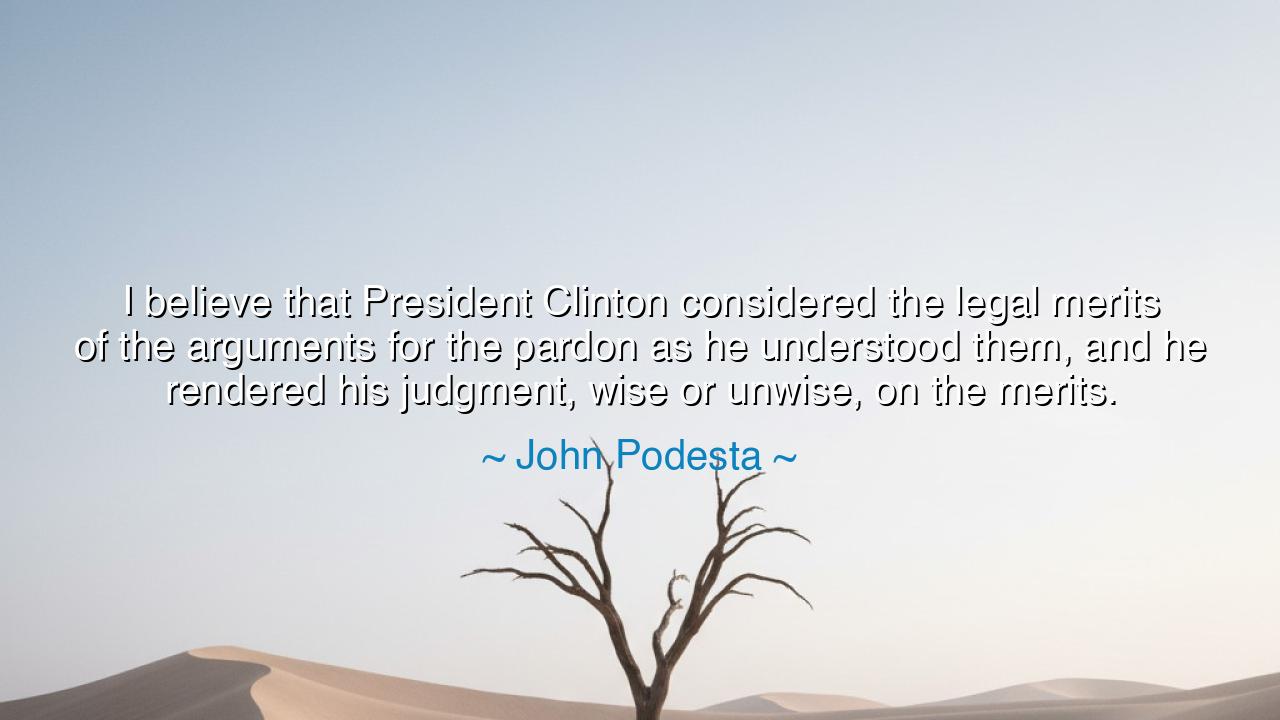
I believe that President Clinton considered the legal merits of
I believe that President Clinton considered the legal merits of the arguments for the pardon as he understood them, and he rendered his judgment, wise or unwise, on the merits.






When John Podesta declared, “I believe that President Clinton considered the legal merits of the arguments for the pardon as he understood them, and he rendered his judgment, wise or unwise, on the merits,” he spoke as one who had witnessed the difficult balance between power and conscience, law and mercy, judgment and legacy. His words carry the tone of a man defending not perfection, but process — the ancient belief that even in error, integrity lies in the sincere exercise of duty. In this statement, Podesta reminds the world that leadership is not about infallibility, but about judgment, and that the measure of a ruler’s soul is found not in the applause of the crowd, but in the weight of the choices he must bear alone.
The origin of this quote lies in the controversy surrounding President Bill Clinton’s pardons at the end of his term in 2001 — most notably, the pardon of financier Marc Rich, a decision that drew public outrage and political fire. As Clinton’s Chief of Staff, Podesta stood close to the eye of the storm, where law, politics, and morality collided. His defense of the president was not an attempt to deny the storm, but to clarify its essence: that Clinton acted as a president, not a politician, and that his decision — whether wise or misguided — was rendered through the lens of legal reasoning, not whim or corruption. Podesta’s words thus rise as a reflection on the timeless struggle between the human conscience and the burden of authority.
Throughout the ages, rulers have faced this same torment. The ancient kings of Israel wrestled with questions of justice and forgiveness; even the mighty Augustus of Rome, though known for order and law, often extended clemency to those deemed enemies of the state. To pardon is not simply to absolve — it is to stand before history and say, I choose mercy where others demand vengeance. Yet mercy is never safe, for the people judge not only the act, but the actor. And so Podesta’s statement, in its careful balance, captures this eternal paradox: that judgment is both divine and dangerous, and that even when rendered with sincerity, it may still be met with condemnation.
When Podesta speaks of Clinton having “considered the legal merits,” he invokes a sacred principle: that every decision of power must first be tested by the fire of law. For law, in the ancient sense, was never merely a set of rules — it was the moral compass of civilization. By affirming that Clinton “rendered his judgment on the merits,” Podesta calls upon this higher order of justice — one that demands deliberation, even when the outcome is flawed. His words remind us that what defines a leader is not perfection in decision, but honesty in deliberation. To act without reflection is tyranny; to act after reflection, even in error, is the mark of humanity.
But there is also humility in his phrasing — “wise or unwise.” Here Podesta concedes the uncertainty that crowns every exercise of authority. In that brief phrase lies a truth older than any republic: that wisdom cannot be guaranteed, only sought. Even the wisest among the ancients — Solomon, Marcus Aurelius, Confucius — made decisions that history would judge both noble and flawed. The ruler’s burden is to act, knowing that he may be wrong, and to accept the consequence with grace. Thus, Podesta’s defense is not a shield against criticism, but a meditation on the human limits of even the most powerful.
Consider the story of Pontius Pilate, who stood before a divided crowd, torn between justice and politics. He washed his hands, believing he could escape the stain of choice — but history judged him not for his neutrality, but for his failure to decide with courage. Clinton, by contrast, chose to act. And Podesta’s words reflect the ancient respect for such courage — that better a flawed judgment born of conscience than the paralysis of indecision. For as the philosophers taught, the act of judgment itself defines leadership, even when its outcome stirs the fury of the age.
The lesson in Podesta’s words, then, is both moral and eternal. To lead is to decide — to weigh the scales of law and compassion, to listen to counsel, to stand before the storm, and to accept the verdict of history without retreat. The wise must remember that authority is not the absence of error, but the presence of responsibility. Whether in the halls of power or the chambers of ordinary life, every human being faces moments that demand judgment “wise or unwise.” The call is not to be perfect, but to act with thought, integrity, and courage — and to bear the consequences with dignity.
And thus, as the ancients would teach, let every leader and citizen alike take heed: wisdom is forged not in certainty, but in struggle. Laws guide us, but conscience must animate them; mercy redeems us, but justice must anchor it. To judge rightly is to walk between these twin pillars with a steady heart. For in the end, as John Podesta reminds us through his defense of another man’s choice, the truest test of leadership is not the absence of criticism — but the endurance of the soul in the face of it.






AAdministratorAdministrator
Welcome, honored guests. Please leave a comment, we will respond soon